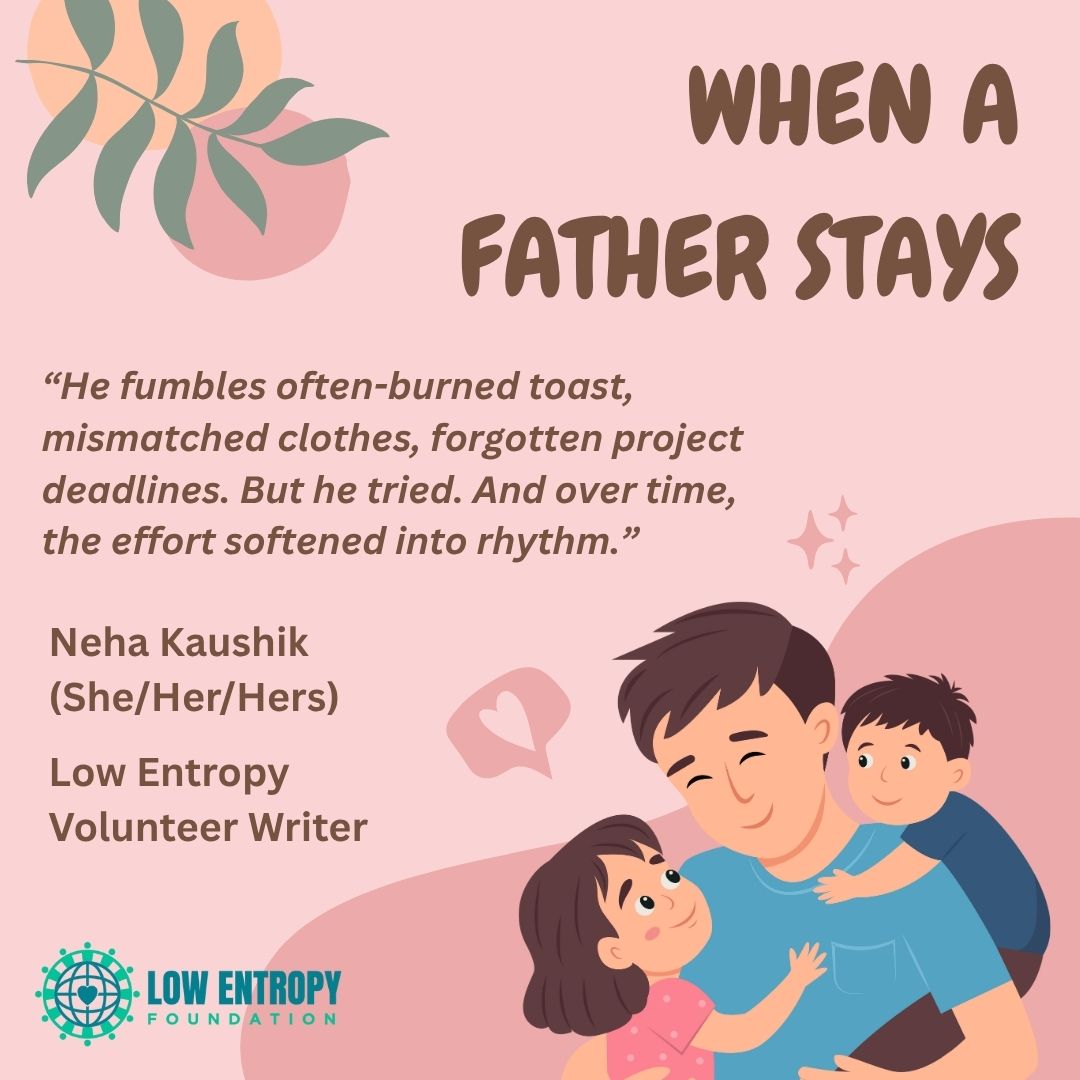Neha Kaushik, Low Entropy Volunteer Writer
There is something silent and enduring about the way a father grieves. He doesn’t always say much, but you can see the sorrow tucked behind his routine—the same breakfast he lays out, the clothes folded just the way she used to fold them, the bedtime stories that sound a little unsure, a little softer than before.
When a mother passes, something enormous goes missing from the everyday rhythm of life. But when a father stays, and chooses not only to stay, but to step into the role she once held, it becomes a quiet act of extraordinary love.
This is a story echoed in many homes, told in soft, worn-out evenings and early morning school runs. It’s a story of fathers who didn’t expect to become both anchor and sail, but did so because love demanded it.
The Day Everything Changed
When she passed, the house felt too large. The absence was loud and impossible to ignore. But more than anything, the children felt it—in the lullabies that no longer came, in the scent that had disappeared from their pillows, in the gentleness that seemed to evaporate with her.
And he felt it too. But there was no time to crumble. Grief would come later, in broken sleep and bathroom tears. For now, shoes needed to be tied, homework had to be checked, lunch boxes filled and appointments remembered.
He began learning things he’d never thought he’d need to. How to braid hair. How to read through a fever. How to sew a button and comfort a broken heart with the right words. He fumbled often—burned toast, mismatched clothes, forgotten project deadlines. But he tried. And over time, the effort softened into rhythm.
Love Without a Manual
Motherhood often comes with books, forums, support groups. Fatherhood, especially of this kind, does not. There’s no handbook for “how to be both,” no guide to mothering while still learning how to grieve.
He had to learn how to hold space—not just for his children’s grief, but his own. There were nights when one child would cry about a school recital without their mom and he would nod, holding back his own tears, making space for them.
In these moments, he learned something new about love. It wasn’t always knowing the right thing to say. Sometimes, it was sitting beside someone and just staying there. That, too, was parenting.
The Struggles
There were so many struggles, both visible and invisible.
There were practical challenges—figuring out the grocery lists she once managed effortlessly, remembering birthdays, juggling office calls with parent-teacher meetings. And then, there were the emotional hurdles.
His daughter’s first period came, and he panicked. Not because he didn’t care, but because he didn’t know. So he called her aunt, searched online and later sat with her, awkwardly but lovingly, trying to be both comforting and informed. She smiled through her discomfort—she could see he was trying.
There were judgmental whispers too. “Children need a mother,” some said. And while that may be true, he proved something else—they need love, presence and tenderness. And he had all three, even if it took time to show it.
The Moments That Made It Worth It
Despite the struggles, there were moments.
There was the time his son said, “You pack my lunch just like mom used to,” and he felt tears sting the corners of his eyes. Or when his daughter hugged him after he clumsily applied eyeliner for a school play and said, “You’re not bad at this.”
These moments didn’t erase the grief. But they stitched new fabric into their family story—one where resilience and gentleness lived side by side.
He created new traditions. Pancake Sundays. Evening walks. Movie nights with popcorn and all the pillows from the house dumped on the floor. These weren’t replacements. They were additions—proof that love can expand, not just fill in gaps.
Redefining Fatherhood
In stepping into her shoes, he didn’t become less of a father—he became more.
He redefined fatherhood, not as a distant protector, but as an involved nurturer. He taught his children that strength includes softness, that masculinity includes care. That it’s okay to not know, to try, to fail and to try again.
He became the arms they ran to, the voice that soothed them, the presence that never wavered. And slowly, they built a different kind of normal.
A Love That Learns to Stretch
He will always miss her. There are some wounds time doesn’t close, it only teaches you to carry. But in her absence, he became something remarkable—not just a parent, but a whole world for his children.
And though he may never admit it, though he might say “I just did what had to be done,” the truth is—he did something rare. He became both sky and shelter. Both question and answer.
He became proof that love, when it stretches itself beyond what it thought it could be, becomes something almost sacred.
In the end, when a father becomes both mother and father, he’s not trying to replace. He’s simply choosing to show up. Again and again. In grief, in growth, in all the ordinary days that slowly begin to feel like home again.
—
Leave your thoughts for Neha in the comments below. You can also follow us on Facebook, Instagram, TikTok, Twitter and YouTube to stay up-to-date with Low Entropy news!

